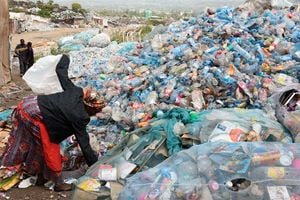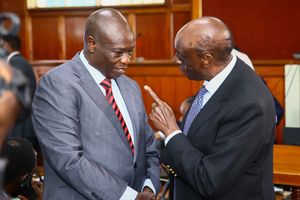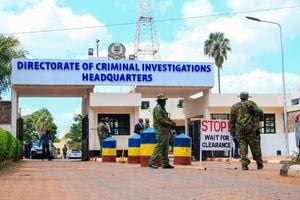Kakuma grapples with garbage crisis amid growing population

Plastic waste collectors at a plastic crusher in Kakuma town on February 18, 2024.
What you need to know:
- With plans still at an advanced stage to fully operationalise Kakuma as the second municipality in Turkana County, authorities in the town are grappling with a waste management crisis amid a rising population.
- Plastic bottles of water and soft drinks are littered on roads and in seasonal rivers like Nabek, Kalobeyei, Nakoyo and Tarach.
Sights of heaps of garbage scattered all over are common as one walks or drives through Kakuma town, Kakuma refugee camp and Kalobeyei Integrated Settlement in Turkana West.
Plastic bottles of water and soft drinks are littered on roads and in seasonal rivers like Nabek, Kalobeyei, Nakoyo and Tarach.With plans still at an advanced stage to fully operationalise Kakuma as the second municipality in Turkana County, authorities in the town are grappling with a waste management crisis amid a rising population.
Following news of conferring the town with a municipality status and an improved road network linking Kenya and South Sudan via Lodwar, Kakuma has been witnessing a rapid population growth, resulting in undesignated dumpsites.
"Our town is choking in garbage despite efforts by development partners to support the county government to tackle the menace. Undesignated dumping sites are a health hazard to us. When it rains, water laced with dangerous poison is washed into seasonal rivers that most locals downstream rely on for domestic uses," Stephen Gicheha, a Kakuma resident, said.
County Director for Environment Phoebe Ekal said: "Our key concern has been the absence of solid waste management infrastructure in Kakuma. This is posing a significant threat to environmental conservation efforts.”
She said there is a need for partnerships to address the lack of a comprehensive system for solid waste collection, transportation, processing and disposal in Kakuma town. However, all is not lost as some agents of change are gradually addressing the garbage crisis.
County Urban Areas Management Executive Peter Akono said the devolved unit has partnered with Peace Winds Japan to roll out a three-year solid waste management strategy.
"Refugees and locals in Kakuma and Kalobeyei towns will benefit from 230 bins for garbage collection, 13 waste transfer sites and waste transportation trucks to boost efforts towards a cleaner environment in the new municipality," Mr Akono said.
He explained that the strategy outlines the process of identifying waste transfer stations, the necessary resources for waste management and the roles of various stakeholders.
Peace Winds Japan Country Director Achiba Kiko said that besides having in place proper solid waste management systems, the organisation will ensure that both locals and refugees have toilets as part of efforts to end open defecation.
Elsewhere, groups of youth and women in Kakuma have been engaging in small-scale recycling of solid waste due.
During a spot check at Kakuma 3, Zone 2, Block 13, the Healthy Nation team meets Efrazia Johari, a refugee from DRC Congo, segregating a heap of plastic waste. "I collect plastic waste in dump sites, homes, streets and seasonal rivers on a daily basis. As a member of Hope for Refugees and Action organisation, we have a storage site where we have kept more than 900 kilogrammes of plastic waste for nine months," Ms Johari said. The community-based organisation’s founder Mpole Wachwa, also a refugee, said their commitment to eliminating plastic waste at Kakuma 3 area has paid off after the establishment of the Fair Recycling Project in town that aims at creating an inclusive plastic recycling ecosystem.





